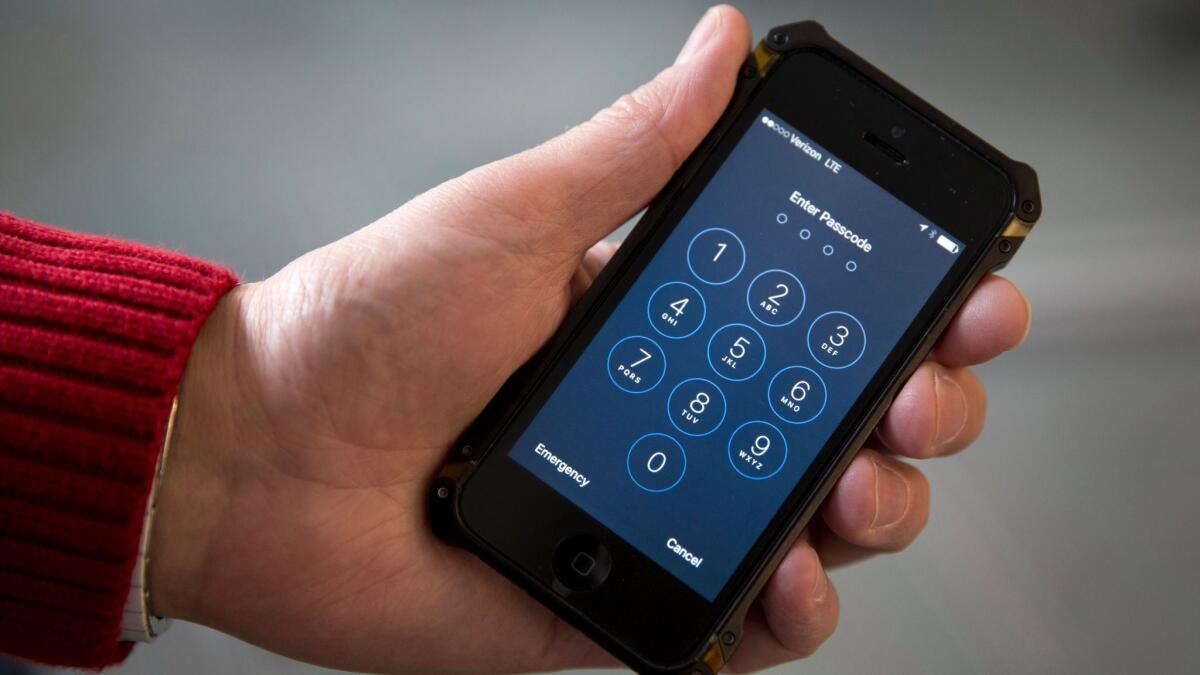Editorial: Border agents want to search a traveler’s laptop and phone? Get a warrant

- Share via
American travelers returning to the United States probably understand that customs officials might search their luggage looking for contraband or weapons. But many would be shocked to learn that agents also have been inspecting the contents of smartphones and laptops, devices that can contain a vast quantity of potentially sensitive personal information. And in addition to poking their noses into personal texts, emails and photos, agents can use whatever they find in such a spontaneous search to bring charges against the device’s owner, even if the allegations had nothing to do with smuggling, terrorism or any border-related crime.
Last week 11 U.S. citizens or permanent residents who have been subjected to warrantless searches filed a lawsuit alleging violations of their 1st and 4th Amendment rights. The suit, filed by lawyers for the American Civil Liberties Union and the Electronic Frontier Foundation, argues persuasively that customs agents should have to obtain a warrant based on probable cause before searching travelers’ devices.
According to U.S. Customs and Border Protection data, agents searched the electronic devices of 14,993 arriving international travelers in the first six months of fiscal year 2017. That is a troubling number even if, as the agency notes, it involves less than 1% of the people arriving in the U.S.
Historically the courts have given customs officials broad powers to engage in border searches, noting the government’s strong interest in protecting its “territorial integrity.” In a 2004 case, the Supreme Court said that “the expectation of privacy is less at the border than it is in the interior.”
But information contained on a smartphone or laptop is different from the contraband and weapons border searches traditionally were designed to uncover — and vastly more revealing.
In defending its search policy, Customs and Border Protection says that electronic media searches “have produced information used to combat terrorism, violations of export controls, and convictions for child pornography, intellectual property rights violations and visa fraud.” But police could no doubt gather similar evidence of wrongdoing if they stopped people walking down the street and conducted warrantless searches of their electronic devices. And under a 2014 Supreme Court decision, police seeking to search smartphones and similar devices even of a criminal suspect in custody must generally obtain a warrant.
In that ruling, Chief Justice John G. Roberts Jr. noted that the vast amount of data collected and stored on cellphones makes them different “in both a quantitative and a qualitative sense from other objects” a person might carry. If a warrant is required to search a person’s electronic devices inside the country, it also should be necessary for a search at the border.
Federal courts, including the Supreme Court, should recognize that reality. Meanwhile, Sens. Ron Paul (R-Ky.) and Ron Wyden (D-Ore.) have introduced the Protecting Data at the Border Act, which would require a warrant for border searches of the electronic devices of citizens and permanent residents. Instead of waiting for the Supreme Court to protect the privacy of travelers, Congress should swiftly approve that bill.
Follow the Opinion section on Twitter @latimesopinion and Facebook
More to Read
A cure for the common opinion
Get thought-provoking perspectives with our weekly newsletter.
You may occasionally receive promotional content from the Los Angeles Times.









